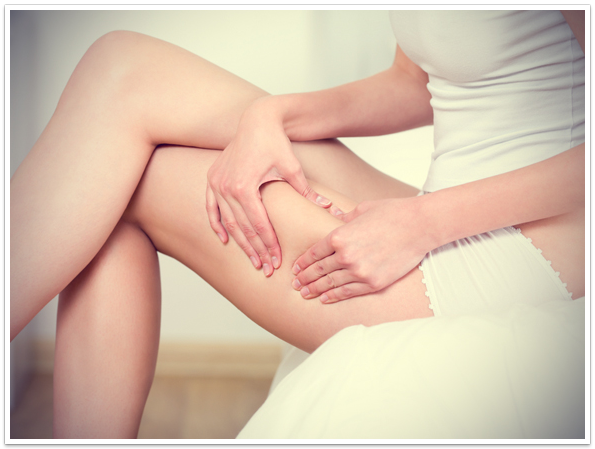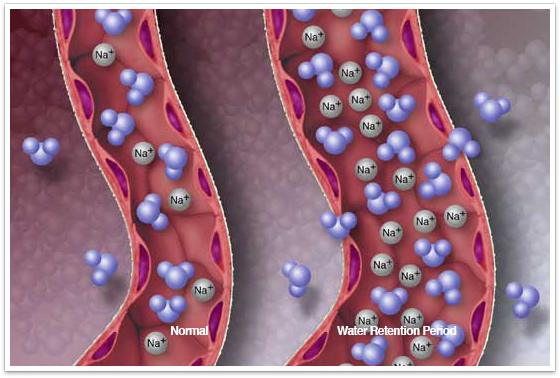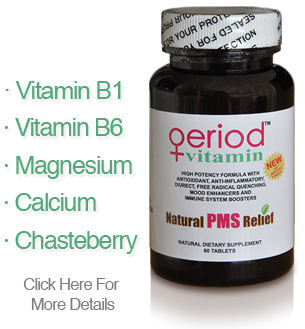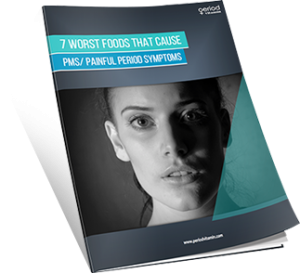Water retention during periods is a common occurrence for most women and it is usually not a pleasant one.
What causes this and what is the average amount of water that is retained?
Why is this a problem for women?
The bloating and fullness that this causes are very uncomfortable and can have other consequences as well.
How long does this water retention last and does it result in an actual weight gain for most women?
 These questions are important and the answers lie in understanding the menstrual cycle and what happens in each stage of the cycle.
These questions are important and the answers lie in understanding the menstrual cycle and what happens in each stage of the cycle.
Then the question becomes what can you do about it if anything?
There are remedies that can be taken to alleviate this or attempt to prevent it. You might be surprised to know that this excessive water retention is felt not only in the abdomen but also in the thighs, upper legs, face and breasts.
Why does this extreme fluid retention happen and what can eliminate it?
First let’s looks at the stages of the menstrual cycle and what causes it.
Menstrual Cycle
Pre-menstrual Stage: This stage occurs about 2-3 weeks before the bleeding period and water retention begins in this stage but it is not extreme yet.
Follicular Stage: In this stage the body produces large amounts of estrogen and the uterine lining begins to thicken. Serious water retention and bloating takes place in this stage. Ovulation begins in this stage.
Luteal Stage: Progesterone replaces estrogen as the hormone in abundance and this means less bloating but there is still water retention at this stage.
Period: In this stage the unfertilized eggs, the excess uterine lining and excess water are flushed out with the period bleeding. Bloat is relieved by this bleeding.
Post Menstrual Stage: This is the period right after the bleeding stops and many women experience all of the premenstrual symptoms including bloat, water retention, weight gain, headaches, cramps, anxiety or depression.
Causes of Water Retention
So now that we know that water retention and bloating tend to occur in the premenstrual and follicular stages and starts to be relieved during the luteal stage and is flushed during the period stage.
For some women this happens every month and for others it is just an occasional gain. However if it starts in premenstrual and goes until bleeding starts to be completely relieved, that can mean 3-4 weeks of water retention and being miserably uncomfortable.
So what are the causes of this water retention and weight gain?
The most common cause is hormonal changes and imbalance due to the increase of estrogen that starts slowly in the premenstrual stage and is excessive in the follicular stage.
The luteal stage sees the estrogen diminish and progesterone increase which maintains an imbalance. This causes fluid to be retained in the feet, hand, legs and abdomen.
Another cause of water retention is the dehydration that can occur before and during the period but mostly before.
Women often do not drink enough water in these stages of the cycle. Dehydration always leads to water retention as the body tries to keep what it has. Finally if a woman has high sodium this will increase the fluid retention.
 Many women experience a higher metabolism rate in the first three stages of the cycle leading to food cravings and increased consumption of sodium. There can also be erratic glucose levels during this time due to reduced magnesium levels and therefore higher sugar consumption.
Many women experience a higher metabolism rate in the first three stages of the cycle leading to food cravings and increased consumption of sodium. There can also be erratic glucose levels during this time due to reduced magnesium levels and therefore higher sugar consumption.
Bloating is also due to gas build up and indigestion. Yet many women simply refer to the weight gain and water retention as bloating.
However it is really gas in the intestines and it usually happens because women are less active in the premenstrual and follicular stages. It might also be the result of constipation and the cause of cramping.
Consequences of Water Retention
There are several consequences of water retention but for the most part these are not serious. Especially when this fluid retention is due to the menstrual cycle, it is not usually serious and it is temporary. For the most part period related water retention will be gone on its own when the period is over and the bleeding has stopped. However for some women there are consequences and some are more serious than others.
• Weight gain: This is a fairly common occurrence with period related water retention. Some women will not gain anything at all but on average the typical woman will gain 1-6 pounds. However it could be as many as 10 pounds for other women.
• Heaviness in breasts: Excess water retention can cause heaviness in the breasts and make it uncomfortable for the woman experiencing this.
• Ascites: This is a serious condition that would be very rare to come from period induced water retention but it has happened to some women. This is severe water retention in the abdomen, far beyond what usually happens with cramping in the menstrual cycle. This extreme amount of water in the abdomen can place pressure on the lungs and make breathing difficult.
• Low Sodium: Excessive water retention can cause low sodium levels. This loss of sodium can result in headaches, nausea, fatigue, vomiting, restlessness, muscle weakness and irritability. At times it could even cause hallucinations.
How to Get Rid of Period Fluid Retention
There are a variety of things a woman can do to reduce the amount of water she retains during her cycle or to prevent excessive fluid retention. Some are very simple while others require a little more effort and commitment. However most women will do what they can do reduce the uncomfortableness of fluid retention.
1. Reduce sodium/salt consumption as sodium induces water retention. It is also true that a lack of sodium can induce the body to get rid of any excess fluid.
2. Diuretics – There are over the counter (OTC) medications developed especially for the symptoms of the menstrual cycle such as Pamprin and Midol. Midol contains caffeine it might not be such a good idea. There are also prescription diuretics that could be used. However the use of diuretics is not really recommended for period water retention as it will usually resolve itself when the period ends.
3. Calcium can prevent and stop water retention during periods so it is important to be sure to get enough. If you are not getting enough in your diet you need to get it through supplements.
 4. Potassium helps in fluid regulation and can be found in foods such as bananas, apples, raisons, apricots, and tomatoes.
4. Potassium helps in fluid regulation and can be found in foods such as bananas, apples, raisons, apricots, and tomatoes.
5. Caffeine should be limited. You do not have to give it up entirely but limit it. If you regularly use caffeine keep using a small amount as it releases endorphins and will assist with how to decrease the impact of other pms symptoms. Caffeine is also a natural diuretic.
6. Chasteberry is an herb that helps with relieving water retention. This herb also increases the production of progesterone and therefore will decrease the amount of estrogen in the system. In this way, chasteberry can bring about a hormonal balance that will eliminate period water retention.
7. Stay hydrated. This may seem counterintuitive but staying hydrated will actually keep the body from retaining fluid. This is because if you keep pushing fluids through your body, your kidneys will flush out excess sodium that might assist in fluid retention.
8. Exercise is vital to preventing or curing water retention. How much exercise is needed? Not that much. Just be sure you do some aerobic exercise daily.
9. Vitamins – if you have any shortage of Vitamin B1, B5 and B6 it can lead to retention of fluids and water. So you might want to use supplements of these vitamins during your cycle.
10. Magnesium helps with alleviating excessive water during the menstrual cycle. It is found in nuts, green leafy vegetables, seeds and whole grains. “The Mayo Clinic recommends taking 200 to 400 mg of magnesium a day to get relief from premenstrual water retention. They add that women suffering from heart or kidney disease should avoid magnesium supplementation.” (http://www.ehow.com/facts_6100582_magnesium-water-retention.html)
11. Diet: This is a big factor in water retention during menstruation because of the many properties in food to retain or expel fluid and how you eat is as important as what you eat. Things to avoid include refined sugar. Avoid simple carbohydrates in favor of complex carbohydrates.
There should be plenty of fiber and lean protein as well. It is recommended that smaller meals be eaten 4-5 times a day instead of three large meals. Eat foods that have a lot of iron and drink at least one glass of milk each day, preferably skim milk. Milk prevents water retention. It is also important to eat foods that have high amounts of water so that this fluid can help the kidneys to flush out all the fluid in the body. These foods include berries, watermelon, cucumbers and lettuce.
So you can see there are not only potentially serious consequences of water retention during periods, there are also few good ways to deal with it.


